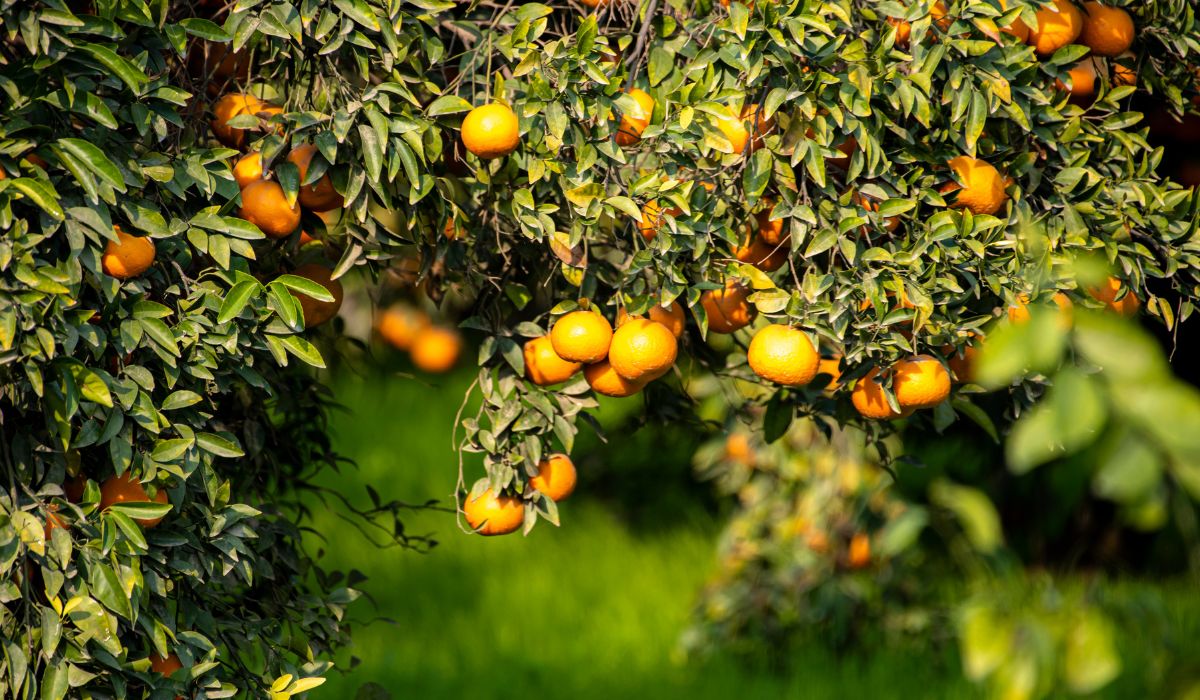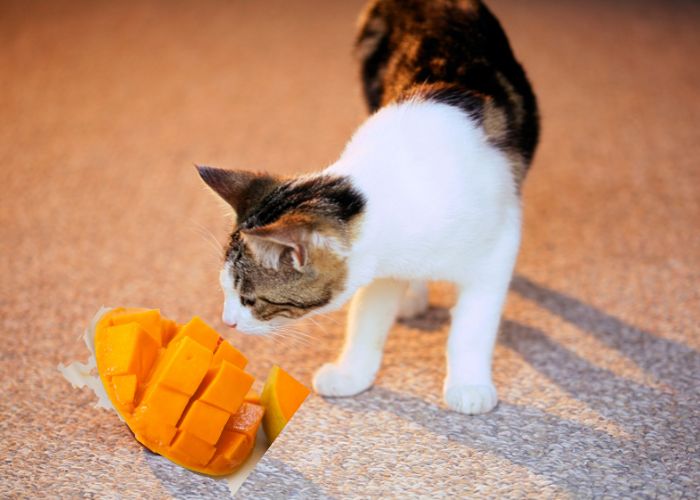It’s creamy, sweet, and an explosion of goodness in your mouth, but can cats eat mangos? If you want to share a bite of this exotic fruit with your cat, you need to know if it’s safe for them.
Mangos are one of the sweetest fruits, and your kitty might be interested when they get a whiff of this sugary fragrance. Some cats might come closer for a quick lick, but others will want to devour the whole thing! Before you give your kitty a chance to explore the flavors of this tropical fruit, you need to know if it’s safe for them to eat.
IMPORTANT: At stuffaboutcats.com, we regularly consult with licensed veterinarians and other industry experts. However, the information found on stuffaboutcats.com should not be viewed as veterinary advice. We do our best to help you better understand your cats, but the information on this blog is not a substitute for veterinary guidance.
In this article, I share whether cats can eat mangos and the possible adverse reaction they may get from doing so.
Can Cats Eat Mangos?
Cats are carnivores, but they need some veggies and fruits in their diet to keep it balanced. Mangos are non-toxic to cats, and you can safely serve them to them.
If your cats are like mine, they’ll sniff a mango right out of the grocery bag! But be careful to overfeed them because too much mango can have adverse effects on your kitty.
The Benefits Of Mangos For Cats
Mangos are filled to the brim with healthy vitamins that can benefit your cat. Although traditional cat food has all the nutrients they require, some extra vitamins always help fight any unwanted illnesses.
Potassium
Mangos are rich in potassium which plays a vital role in your cat’s body as an electrolyte. This helps them fight against kidney failure and other serious diseases typically caused by a potassium deficiency.
Vitamin A
Felines need vitamin A for a boosted immune system that will help shield them against illnesses. Mangos are a great source of vitamin A, but only feed it to your kitty in small amounts since an overdose can have adverse effects.
Vitamin C
Mangos contain vitamin C, and while cats can produce their own, every tiny bit extra will help keep them healthy!
Vitamin B6
Vitamin B6 is great for cats as it helps their body properly absorb fat and proteins from whichever foods they eat.
How To Feed Mangos To Your Cat
Mangos are best consumed by cats in their natural form. You should avoid feeding your cat the skin or pit, so remove both before serving it. Here are some ideas on including mango in your kitty’s meals in an exciting way!
Chopped And Blended Mango
Chopping and blending mangos into a puree is a great way to serve it to your feline friend! You can pour the blended mango juice over their dry food or mix the pulpiness into their wet food. If they’ll drink it, you can serve it as a cold treat too.
Remember to leave sugar and salt out.
Dried Mango
My cats never liked fresh mango, but the texture of dried fruit intrigued them! Drying your own mangos at home is best because store-bought ones contain a lot of added sugars.
You can serve dried mango to your cat as an occasional treat or dice it up to mix it into their wet or dry food.
How Many Mangos Can Cats Eat?
Some cats will rush for their mango treats, but there’s nothing wrong with your kitty if they take a big nose full of mango and decide to leave the eating part for you.
Not all cats prefer the tropical aroma and sweet taste of mangos, but if your feline is more eager to take a bite than you, you should keep an eye on how much they eat! Mangos should never replace your cat’s main meals, and keeping portions small is more beneficial to cats than serving them big bowls of it.
If your cat likes mangos, you can serve them about 3 slices per week.
What Happens When A Cat Eats Too Much Mango?
Mango contains Vitamin A, which isn’t good for cats in large amounts. Too much of this vitamin can lead to hypervitaminosis (also known as vitamin A poisoning), leaving your kitty with permanent liver damage. Another adverse reaction is excessive bone growth, and this defect can’t be reversed.
Luckily, there are some signs you can easily spot to help you determine if your kitty is getting too much Vitamin A in its diet. Knowing what these are can save your cat from a lifetime of pain!
The signs of Vitamin A poisoning include:
- Appetite loss
- Drowsiness
- Irritability
- Joint and bone pain
- Skin peeling
- Vomiting
If you notice any of these signs after your cat ate foods high in Vitamin A, like mangos, immediately take them to a vet!
Read more about Is Pineapple Good For Cats?
In Conclusion
The flesh of mangos is entirely safe for cats to eat, but you should never give them a taste of the skin or pit. These are toxic to felines and can make your kitty extremely ill – not even to mention that it’s a choking hazard!
Your cat will probably be drawn in by the sweet smell of mangos when you cut into this fruit, and there’s no need to keep them waiting for too long. A little piece here and there will do your kitty no harm. In fact, the vitamins they get will help keep them healthy!
I hope you found this article helpful in deciding whether you should feed your cat mango or not. While cats can eat mangos, you should always watch for signs of intolerance. If you have any more questions about this fruit and your kitty, ask them in the comments!
Can cats eat dried mango?
Yes.
You can give your cat dried mango as an occasional treat, but avoid those bought in shops and rather make your own at home!
Can cats eat mango skin?
No.
The skin of a mango can be toxic to your kitty.
Can cats eat mango ice cream?
Yes.
You can give your cat a bite of mango ice cream, and a bit more if you make your own! Remember to leave sugar, salt and preservatives out.
Can cats have mango juice?
Yes.
Fresh mango juice is perfectly safe for cats to drink, but avoid giving them those from the store.
Read more about Predator To Prey: Can Owls Eat Cats?

